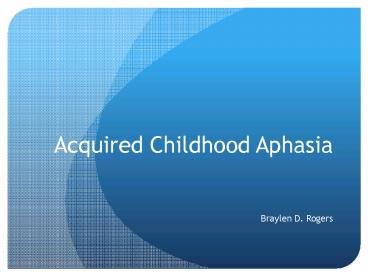Acquired Childhood Aphasia - PowerPoint PPT Presentation
1 / 21
Title:
Acquired Childhood Aphasia
Description:
4% of all children kindergarten through twelfth grade have ... Language regression may be gradual or sudden. Males are affected twice as often as females ... – PowerPoint PPT presentation
Number of Views:2146
Avg rating:3.0/5.0
Title: Acquired Childhood Aphasia
1
Acquired Childhood Aphasia
- Braylen D. Rogers
2
Definition
- Children with acquired language disorders had
begun to develop language normally but then lost
all or part of their communicative abilities as a
result of neurological damage.
3
Types of Brain Injury
- Traumatic Brain Injury (TBI)
- Strokes and Tumors
- Landau-Kleffner Syndrome
4
Traumatic Brain Injury (TBI)
- Every year children 14 years and younger sustain
a TBI that result in 3,000 deaths - 29,000 hospitalization
- 400,000 emergency department visits
- 4 of all children kindergarten through twelfth
grade have experienced some type of head trauma
5
Causes
- Different age groups different causes
- Infants falls or abuse
- Preschoolers falls
- Young school-age Sports (thats me) and
accidents involving them as pedestrians, bike or
skateboard riders - Adolescents sustain the most accidents, primarily
as the result of motor vehicles
6
Classification
- Based on scores of the Glasgow Coma Scale
- 13-15 mild brain injury
- 9-12 moderate brain injury
- 3-8 severe brain injury
7
The Glasgow Coma Scale
8
Strokes and Tumor
- Are most common causes for adult aphasia
- Only 0.5 per 100,000 children under 15
- More than 1/3 of childhood strokes occur during
the first two years of life
9
Causes
- The common causes of stroke in children are
cardiac disease, vascular occlusion sickle cell
disease, vascular malformation and hemorrhage.
10
Landau-Kleffner Syndrome
- Least frequent cause of acquired language
disorders - A distinctive syndrome in which convulsive
disorder, indicated by abnormal
electroencephalogram (EEG) tracings, occurs at
about the same time as a breakdown in language
11
Conditions
- It has a low incidence. Only 198 cases reported
since 1992 - Age of onset ranges from 1½ to 13 years
- Language regression may be gradual or sudden
- Males are affected twice as often as females
- Changes in aphasia, seizures and show normal EEG
tracings but continue to exhibit aphasia. Others
show opposite pattern
12
Language Development and Language Recovery
- The prevailing view has been that brain-injured
children differ from adults in three ways - They have a lower risk of aphasia
- They present different language symptoms
- They recover faster and more fully than adults
13
Recovery
- Toddlers and young children generally appear to
recover best because - Their brains withstand injury better than those
of infants - They have established certain spoken language
skills and sometimes written language skills
prior to injury - They still have enough plasticity for functional
reorganization of the brain to occur
14
Recovery continued
- After age 5, childrens patterns of recovery from
TBI become increasingly like those of adults - However, children who acquire aphasia secondary
to convulsive disorder generally recover better
when onset occurs at older age - Type and location of brain injury may also affect
a childs recovery
15
Language characteristics of kids with acquired
aphasia
- The first three months to a year following the
brain injury is referred to as a period of
spontaneous recovery
16
Acute Recovery Period
- Comprehension A wide range of comprehension
impairments are found among children with acute
aphasia - The severity of the comprehension disorders
corresponds to the severity of the injury - A study of 57 children and adolescents with mild
to moderate-sever closed head injury found that
more than 18 had poor auditory comprehension of
syntactically complex sentences but only 2 had
trouble understanding single words.
17
Word Retrieval
- Difficulties with word retrieval are frequently
observed in children with acquired aphasia - 9 of children with mild-to-moderate were
hampered in confrontation naming - 18 had trouble retrieving words in specific
category - Few studies have documented lexical difficulties
with left-sided vascular lesions - Landau-Kleffner show word substitutions and word
retrieval problems
18
Academic Achievement
- Though many children with acquired aphasia can be
considered as fully recovered there still can
be effects on academics - Even effect intelligence testing
- Next table shows possible effect
19
Academic Difficulties for Kids with Severe Head
Injury
20
(No Transcript)
21
Other Academic Problems
- Limited self-awareness of communication problems,
which leads to a reluctance or unwillingness to
work on them - Difficulty initiating conversation
- General self-evaluations (its okay or its
all wrong) that do not lead to constructive
responses

